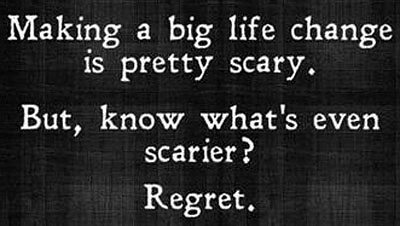Life
7 Ways Letting Go Will Create Immediate Success

Right now you’re like Santa Claus. You have a big bag that you carry around with you every day of your life. But this bag is not full of presents; it’s packed with worries, concerns, past memories, regrets – all sorts of things that keep pulling you back.
All of these things don’t allow you to be the best that you can be.
Letting go of everything is actually what you need to do in order to succeed. “So how do I let go?”, you might ask.
Here are 7 ways of letting go and achieving immediate success
1. Letting Go of Memories
Many people feel that memories are the most important thing they have.
They place memories in a treasure chest and cherish them or regret them, depending on the memory, whenever they get a chance to.
As the years go by, this treasure chest is getting heavier and heavier.
It’s hard to carry it around – all the mistakes of the past, all the beautiful moments you’ve enjoyed. And although you might feel like all of these memories make you who you are today, they are also keeping you from becoming the person that you can become.
Don’t be afraid to let go of these memories.
You don’t need to forget them, but simply stop thinking about them so that you can create new ones.
2. Not Being Complacent
Letting go of that complacency and pushing yourself to grow is the key to success.
By being complacent, you’re just building a fence around yourself and stopping yourself from expanding. You must open your eyes and realize that everything you do, be it something big or small, is something great.
Think about it this way: what would have happened if you hadn’t woken up this morning? You wouldn’t have been reading this now and you would be one step further away from success.
What if you hadn’t learned to read when you were in school? You wouldn’t be able to understand this sequence of letters called words and you wouldn’t be able to comprehend this article.
Realise and understand that everything you do each and every day matters.
3. Letting Go of Fears
Fear is what holds you back from doing great things. Don’t be afraid to learn something new. Don’t be afraid to start over. Don’t be afraid of letting go of fears and allow yourself to be happy. Close your eyes and visualize all of your fears. Grab them and throw them in the trash can. And then pick up the trash can and take the garbage out.
You are fearless. You are capable of doing anything you want. You can move on with your life and you can achieve great things.
If you overcome your fears, you can be successful!

4. Letting Go of Pain and Anger
Let go of all of the pain and anger that you are keeping inside. These are negative emotions that just eat you up from the inside out. Free up space to let in new and better emotions.
Love and happiness don’t have room because of all those negative emotions you’re hanging on to. There’s nothing positive or fun about feeling all of these negative feelings. You’ve gone through some things that hurt you and made you feel angry, but these experiences only made you stronger. Because you’ve survived, because you are still here today – living, breathing, feeling.
You are strong and you can let go of anger and pain because these emotions don’t define you.
You are better off without them.
5. Embracing the Unknown
What lies ahead can be scary, we never know what tomorrow holds for us. But that is a part of life. Don’t hold back and embrace the unknown. Whether you’re having doubts about that new job, that new school or maybe that new relationship. If you don’t try, you cannot succeed.
By embracing the unknown you can achieve instant success in many parts of your life.
Believe in yourself and have faith in what you can do!
6. Letting Go of Stress
Stress is one of the major factors of failure, dissatisfaction and unhappiness. But nowadays, stress is part of our everyday life.
Did you know that people who are truly successful are almost never stressed out? This is actually why they have succeeded in life – because they haven’t permitted the small things in life to influence them or stress them out.
Keep calm and give yourself time to relax and regroup.
7. Not Overthinking Success
Thinking too much about succeeding is what might be holding you back. While visualizing that point where you achieve success is a good thing, over thinking it might do more harm than good.
Instead of imagining every day how it will be like when you will have made it, spend that time working towards your goal. This way you will get there a lot faster and youwill be able to enjoy success instead of just thinking about it.

Life
Imposter Syndrome Is Rooted in Your Past But Here’s How You Can Rewire It
Imposter syndrome is most prevalent in highly successful women

Imposter syndrome is “the persistent inability to believe that one’s success is deserved or has been legitimately achieved as a result of one’s own efforts or skills.” (more…)
Life
The Surprising Mental Health Tool You Probably Haven’t Tried
Through journaling, I arrived at a more balanced perspective, it reinstated my sense of gratitude and led me to accept my disability

In two particularly difficult times in my adult life, my journaling practice is helping me heal emotionally. It has been a vital tool for helping me see the bigger picture and land in a place of gratitude. (more…)
Life
How to Stop Comparing Yourself to Others and Find True Happiness
Comparison is the thief of joy; it robs us of our happiness, self-esteem, and peace of mind

In today’s hyperconnected world, it’s easier than ever to fall into the trap of comparing ourselves to others. Social media platforms like Instagram, Facebook, and LinkedIn constantly bombard us with curated highlights of other people’s lives, making it seem like everyone else is happier, more successful, and more fulfilled than we are. (more…)
Life
Harness the ‘Battery Effect’ to Transform Life’s Tensions into Your Greatest Strength
Recharge your life batteries by shifting your mindset today

I believe our life capacity is determined by the skillsets we develop on this spinning rock we call Earth. By “life capacity,” I mean our ability to embrace and sustain joy. (more…)
-

 Did You Know4 weeks ago
Did You Know4 weeks ago7 Surprising Life Lessons Video Games Taught Me That School Never Did
-

 Success Advice4 weeks ago
Success Advice4 weeks agoHow Playing by the Rules Became the Smartest Business Strategy
-

 Success Advice4 weeks ago
Success Advice4 weeks agoHow to Build Trust, Kill Micromanagement, and Lead a Team That Thrives
-

 Success Advice3 weeks ago
Success Advice3 weeks agoSuccess Isn’t Sexy: 5 Daily Habits That Actually Work
-

 Scale Your Business3 weeks ago
Scale Your Business3 weeks agoHow to Build a Workplace People Actually Want to Show Up To
-

 Scale Your Business3 weeks ago
Scale Your Business3 weeks agoHow Smart Entrepreneurs Cut Financial Chaos in Half with One Simple Switch
-

 Success Advice3 weeks ago
Success Advice3 weeks agoBreaking the Bias: How Females Can Thrive In The Workplace in 2025
-

 Scale Your Business3 weeks ago
Scale Your Business3 weeks agoThis Is How Successful Entrepreneurs Manage Their Time Differently






























17 Comments